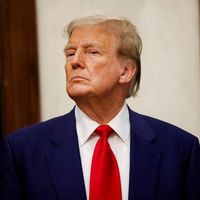Iran, US open third round of nuclear talks in Oman
Iran and the United States opened a third round of nuclear negotiations in Oman on Saturday.
Foreign Minister Abbas Araghchi is leading Iran’s delegation. The US State Department confirmed that Steve Witkoff, the special envoy for nuclear affairs, is heading the American team, alongside Michael Anton, who previously served as National Security Council spokesman during Trump's first term as leading the American technical delegation.
“We’re having very serious meetings, and there are only two options. And one option is not a good option. It’s not a good option at all,” President Donald Trump said Friday, according to Reuters. He added, “I think we’re doing very well with respect to Iran.”
The negotiations follow last weekend’s session in Rome. Iranian officials are said to be willing to return to the technical constraints of the 2015 nuclear deal, including reactivating International Atomic Energy Agency surveillance cameras at nuclear facilities.
Under the 2015 Joint Comprehensive Plan of Action (JCPOA), Iran was restricted to enriching uranium up to 3.67 percent with a stockpile limit of 300 kilograms.
Following Washington’s unilateral withdrawal from the accord in 2018, Iran expanded enrichment to 60 percent and accumulated more than 8,000 kilograms of uranium, while maintaining that its program remains civilian in nature.
An Iranian official participating in the negotiations told Reuters that "the only remaining point of disagreement in the general discussions and mutual understanding is the missile issue."
According to the official, Iran's position — that it would not exceed the obligations outlined in the 2015 deal and related resolution — means it would "only refrain from building missiles capable of carrying nuclear warheads as a gesture of goodwill."
Both negotiating teams arrived in Muscat on Friday. Araghchi and Omani Foreign Minister Badr Albusaidi later attended the Muscat International Book Fair, where Araghchi’s Arabic-language book The Power of Negotiation was unveiled.
Witkoff traveled to Oman after meetings with Russian President Vladimir Putin in Moscow.
Iranian state media reported the talks were initially scheduled for one day but may be extended depending on technical progress.
The outcome could shape whether Iran steps back toward nuclear restrictions or deepens a confrontation already straining regional security.







